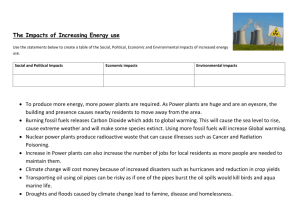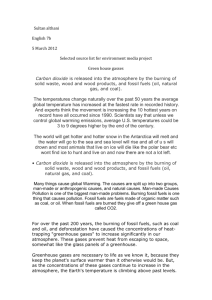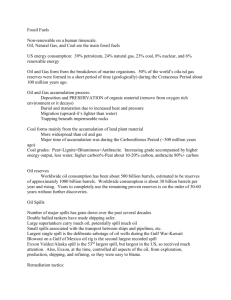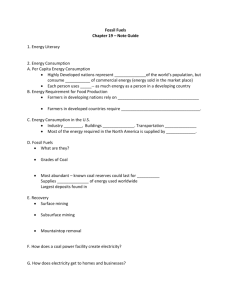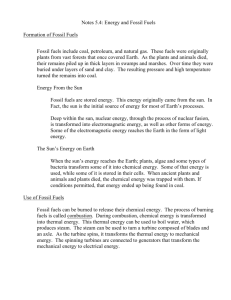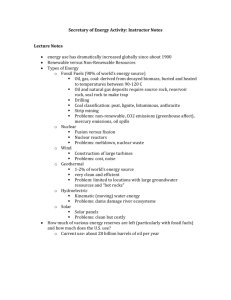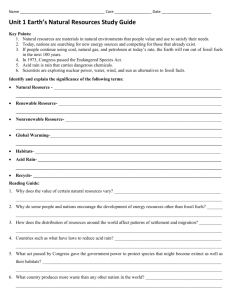Statement by Professor Henry Shue Madame High Commissioner
advertisement
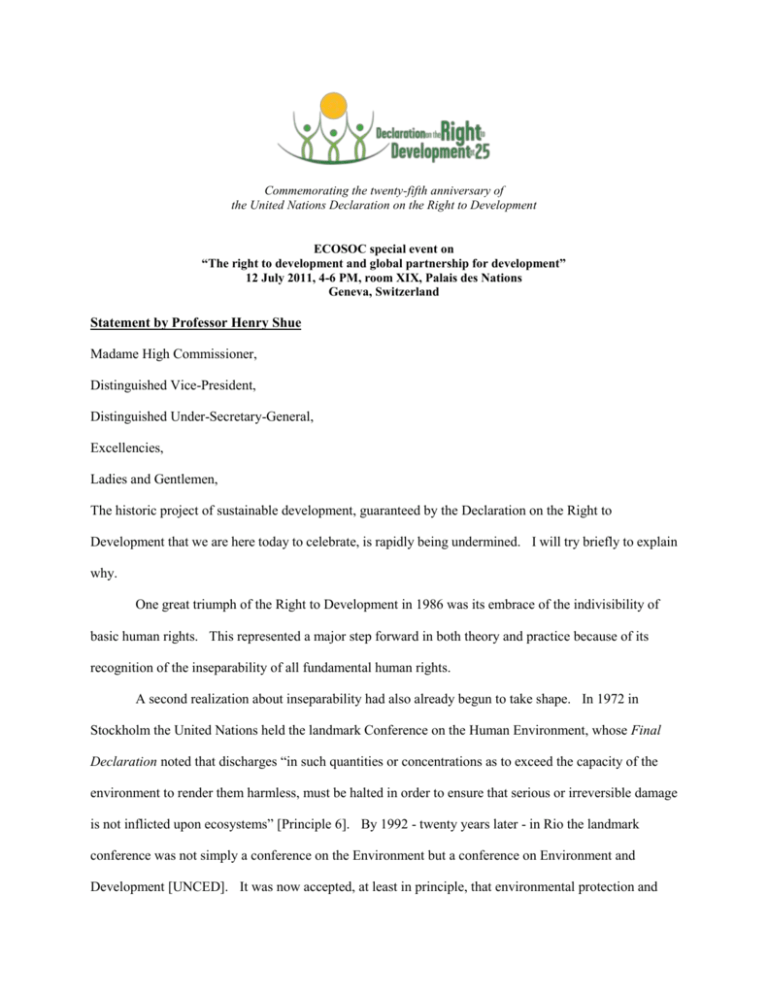
Commemorating the twenty-fifth anniversary of the United Nations Declaration on the Right to Development ECOSOC special event on “The right to development and global partnership for development” 12 July 2011, 4-6 PM, room XIX, Palais des Nations Geneva, Switzerland Statement by Professor Henry Shue Madame High Commissioner, Distinguished Vice-President, Distinguished Under-Secretary-General, Excellencies, Ladies and Gentlemen, The historic project of sustainable development, guaranteed by the Declaration on the Right to Development that we are here today to celebrate, is rapidly being undermined. I will try briefly to explain why. One great triumph of the Right to Development in 1986 was its embrace of the indivisibility of basic human rights. This represented a major step forward in both theory and practice because of its recognition of the inseparability of all fundamental human rights. A second realization about inseparability had also already begun to take shape. In 1972 in Stockholm the United Nations held the landmark Conference on the Human Environment, whose Final Declaration noted that discharges “in such quantities or concentrations as to exceed the capacity of the environment to render them harmless, must be halted in order to ensure that serious or irreversible damage is not inflicted upon ecosystems” [Principle 6]. By 1992 - twenty years later - in Rio the landmark conference was not simply a conference on the Environment but a conference on Environment and Development [UNCED]. It was now accepted, at least in principle, that environmental protection and 2 sustainable human development were inseparable too; and the only human right explicitly mentioned in the text of the Framework Convention on Climate Change is the right to sustainable development, which the parties agree they “should, promote” [Article 3.4]. But UNCED in Rio, and the adoption of the Framework Convention was only half a step forward, because the yoking of environment and development was only a political compromise. I remember these days well. No one dared to deny the importance of either environment or development, because there was what the British call a political “stitch-up”, but in practice many member states devoted their efforts to only one or the other. Some of course ignored both. However much indivisibility there might be in theory, in political practice there was a division of labor. National leaders said things like, “if you are really worried about what is happening in the atmosphere several decades from now, fine, but I have to worry about clean water and adequate food for my people next week”. Because of my almost life-long commitment to subsistence rights, I was very sympathetic to those who said that they had no choice but to put priority on water and food next week. But the sad and tragic discovery recently made by our best atmospheric scientists is that the belief that we can choose between the atmosphere later and the right to development now is an illusion - perhaps the Great Illusion of our time. The most fundamental and potentially devastating threat to sustainable development is the rapidly accelerating climate change that is now underway. This turns on one simple but crucial fact: once the carbon dioxide from the burning of coal, oil, and gas enters the atmosphere, it stays for at least 1000 years - what the scientists call the “atmospheric residence time” of carbon dioxide is millenial. This means that we cannot continue to burn coal and oil and then change our minds later. Later the damage will already have been done: the carbon dioxide will already be in the atmosphere, producing havoc here on the surface. We now know that for any given amount of temperature rise here on the surface of the planet that we decide we are willing to try to tolerate, there is a corresponding maximum budget of cumulative carbon emissions into the atmosphere. Exceed the cumulative carbon budget for any given temperature, and the 3 temperature goes higher. The main sources of atmospheric carbon are the burning of coal, oil, and gas, and the carbon stays in the atmosphere at least 1000 years once it is there. “Emitting the carbon from all proven fossil fuel reserves would therefore vastly exceed the allowable CO2 emission budget for staying below 2º C.”1 “Less than half the proven economically recoverable oil, gas, and coal reserves can still be emitted up to 2050”2 if we are to have even only a 50/50 chance of avoiding warming that exceeds 2º C beyond pre-industrial levels. In sum in order to have merely a 50% chance of not going beyond 2º C, at least 50% of proven reserves must not be used. The protection of the right to development means that at least half of the proven reserves of coal and oil must stay beneath the surface of the earth where it is now, at least until the development of sequestration techniques far more efficient than anything remotely on the horizon. Everyone increasingly agrees in theory that basic human rights are threatened by climate change, and many solemn pronouncements contain a commitment to preventing temperature rise from exceeding 2º C. But very few member states are facing up to the stark practical reality of what is involved in not exceeding 2º C. You here know the dilemma well. Development depends on additional energy. More than 1.5 billion people lack access to electricity. Development for them depends on energy in general and electricity in particular. The more developed countries have obtained vast proportions of their energy, including their electricity, from fossil fuels. This has been filling up the available sinks - using up the available global budget for cumulative carbon emissions - until now little room is left below any ceiling compatible with keeping temperature rise from climate change below 2º C. But those who are developing need much more energy than they have now. What is the world to do? If there is to be development, there ------------------------------------ 1 Malte Meinshausen, Nicolai Meinshausen, William Hare, et al., „Greenhouse-gas emission targets for limiting global warming to 2º C,‟ Nature, vol. 458 (30 April 2009), 1158-1163, at 1160. 2 Ibid., 1158. 4 must be more energy, but if there is not to be catastrophic climate change, most of that energy cannot come from fossil fuels. This is the frightening reality that leaders like you must lead the world through. There is only one alternative. A commitment to human rights means that development must proceed and indeed increase in pace, but if we are not to cause climate change of a degree that will undermine agriculture, threaten human habitation, and wreak various other kinds of distress upon those with the fewest resources with which to adapt, the world‟s energy cannot be fueled by coal, oil, or gas for very much longer. We must escape from carbon-based fuels long before the reserves are exhausted indeed, before they are more than half exhausted. We must make the transition to alternative forms of energy as rapidly as possible. Who should pay? Those who are best able to pay, and those who have used up the available sinks. The shameful failure of my own country, the United States, to shoulder even a fraction of its own fair share of the transition costs - for the transition from fossil fuels to alternative fuels - is appalling and unforgivable. But the whole planet cannot continue business as usual until the light dawns in the U.S. Senate, many of whose members have defiantly closed their eyes in any case.3 Very little time for decisive action to stay within the carbon budget remains. Developing countries for whom the only affordable fuels at present are fossil fuels may need to continue to rely on them very briefly – they are, in the words of the Cancun Agreements, entitled to “equitable access to sustainable development”.4 But if they follow the bad example of the developed world and rely on carbon-emitting fuels for much longer, they help to cut their ------------------------------------ 3 Henry Shue, „Face Reality? After You! - A Call for Leadership on Climate Change,” Ethics & International Affairs, 25:1 (2011), 17-26. 4 Decision 1/CP.16, „The Cancun Agreements: Outcome of the work of the Ad Hoc Working Group on Long-term Cooperative Action under the Convention,‟ in Report of the Conference of the Parties on its sixteenth session, Addendum, Part Two: Action taken by the Conference of the Parties, FCCC/CP/2010/7/Add. 1 (15 March 2011), para. 6. 5 own throats. Their agriculture too will be disrupted, they too will suffer both the worsening floods and the more severe droughts that are part of climate change. And the developing countries have the least resources for adaptation. Clearly it is the now-richer countries who have driven the planet to the edge of the cliff, but it could be the now-poorer countries who help to push it off the cliff. The undoubted fact that it is mainly the historic responsibility of the developed countries that the entire planet faces a severe shortage of sink space for additional carbon emissions,5 as morally shocking as this is, does nothing to change the stark fact that all of humanity does indeed face a severe shortage of carbon sinks. If we attempt to deny this reality, all our children will be worse off than we are, and our grandchildren, much worse off still. Humanity has so far undergone two great revolutions. First came the Agricultural Revolution, which allowed stable human settlements and eventually great cities, supplied with food by the productivity of the agriculture. Second was the Industrial Revolution, which brought us contemporary levels of wealth and consumption. But the Industrial Revolution was a Faustian Bargain because the fossil-fuel energy that created modern wealth is, we have recently discovered, undermining the very environment that supports our economy and especially our agriculture. The second revolution threatens to undercut the first. The third great revolution must, therefore, be the creation of an escape route from fossil-fuel energy and a path to the most rapid possible transition to alternative sources of energy in order to preserve the ecological pre-conditions for sustainable development and indeed for agriculture. The most plausible exit strategy away from carbon emissions is the initially subsidised rapid expansion of renewable energy in order to speed the day of the tipping point when adequate energy becomes affordable for all, alleviating the ------------------------------------ 5 Henry Shue, „Historical Responsibility,‟ Technical Briefing for Ad Hoc Working Group on Long-term Cooperative Action under the Convention [AWG-LCA], SBSTA, UNFCC, Bonn, 4 June 2009 <http://unfccc.int/files/meetings/ad_hoc_working_groups/lca/application/pdf/1_shue_rev.pdf> 6 crippling energy poverty that blocks sustainable development while alleviating the crippling climate change that would undermine even the development already achieved.6 The world desperately needs decisive unified leadership – genuine global partnership. I appeal to the member states represented in ECOSOC to use this institution to provide that leadership by breathing new life into global partnership. The days when one member state could say, “we‟re interested in jobs, so we will support the ILO,” and another could say, “we‟re interested in health, so we will support WHO” are long gone. So are the days when a member state could say “we‟re interested in development, so we can‟t afford to worry about the environment”. It is all interrelated - jobs, health, development, environment and it all depends on a rapid transition away from an economy dependent on the fossil fuels that are spewing out ever-increasing amounts of carbon that will linger in the atmosphere and disrupt life as we have known it, for generations to come for more than a thousand years. You must lead us toward what a study for the Department of Sustainable Development has called “A Global Green New Deal”.7 Our grandchildren rely on you for leadership. In the name of universal human rights, especially the rights of the vulnerable generations to come, I wish you the courage to create the regime of affordable alternative energy indispensable to sustainable development. - Henry Shue Centre for International Studies University of Oxford ------------------------------------ 6 See United Nations, Department of Economic and Social Affairs, Division for Sustainable Development, „A Global Green New Deal for Climate, Energy, and Development,‟ Technical Note (UN/ESA/DSD) (December 2009). http://www.un.org/esa/dsd/resources/res_pdfs/publications/sdt_cc/cc_global_green_new_deal.pdf 7 Ibid.


